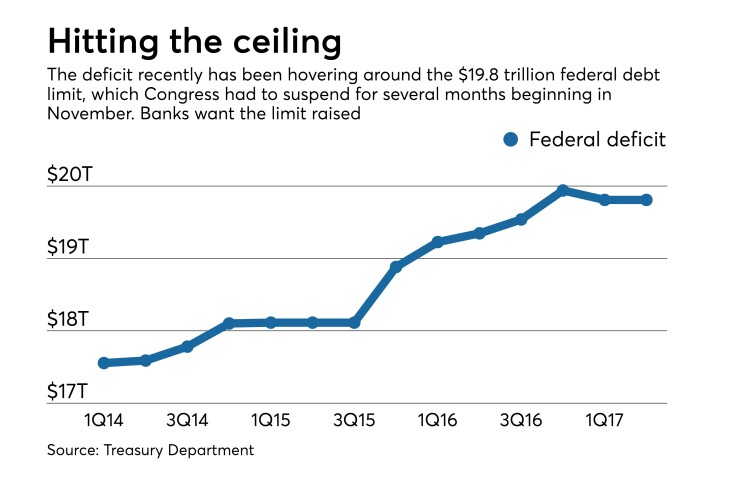What will the fallout be for banks if the federal debt ceiling is breached late next month? It's safe to say that they would rather not find out.
Worst-case-scenario predictions include higher funding costs, a decline in liquidity, weaker loan demand and decreased fee income. The market uncertainty would also almost certainly produce a steep decline in bank stock prices.
Still, no one knows for certain what the specific results would be if Congress doesn’t raise the debt ceiling before Sept. 29, which is when Treasury Secretary Steven Mnuchin has said the government will run out of money to pay its bills. But most observers warn that the result could be an economic catastrophe, something the banking industry doesn’t want to see.
“Hopefully we never get there,” said Michael Keim, president of the $4.5 billion-asset Univest Bank & Trust in Souderton, Pa.

The federal deficit is only $25 million shy of surpassing the $19.8 trillion debt limit.
Congress must agree to raise the limit,
However, political squabbling could get in the way. President Trump has threatened to shut down the government if Congress does not provide funding to build a wall along the Mexican border. On Wednesday morning, Trump blasted the “
I requested that Mitch M & Paul R tie the Debt Ceiling legislation into the popular V.A. Bill (which just passed) for easy approval. They...
— Donald J. Trump (@realDonaldTrump)
August 24, 2017
...didn't do it so now we have a big deal with Dems holding them up (as usual) on Debt Ceiling approval. Could have been so easy-now a mess!
— Donald J. Trump (@realDonaldTrump)
August 24, 2017
In the meantime, federal and state regulators are assuming the worst could happen, said Walter Mix III, a former California state banking commissioner. That includes formulating plans to maintain the safety and soundness of the banking sector.
“Regulators are preparing behind the scenes for the possibility” of a federal debt default and what steps they might need to take, said Mix, now head of the financial services practice at Berkeley Research Group.
The possibilities are almost all bad, as global markets would be thrust into a state of shock, said Mark Doctoroff, head of the U.S. financial institutions group at Mitsubishi UFJ Financial Group.
The market volatility would “ultimately cause interest rates to rise and the cost of borrowing to increase,” Doctoroff said.
Industry analysts and consultants offer a variety of forecasts on how that situation would manifest inside the banking sector.
Mix predicted that rates would rise for overnight and short-term borrowing, which would cause banks to become less willing to borrow from each other. The result would be that liquidity could dry up throughout the banking sector, he said.
“It’s principally larger financial institutions that provide short-term lending, but there is a tributary effect on their customer base, which includes smaller financial institutions,” Mix said.
Higher rates would, of course, lead to weaker loan demand. Corporations that need to borrow to fund daily operations would feel the brunt immediately, Univest's Keim said.
“The larger companies that need to borrow to fund day-in, day-out operations, they would be the most impacted,” Keim said.
Banks would also be less willing to make credit available to riskier borrowers, said Fred Cannon, director of research at Keefe, Bruyette & Woods. That is because banks’ own risk appetites would become more conservative and because the market would see a flight to safety from corporate debt issuances to Treasurys.
“Generally, if the risks in the system have seemed to increase, investors tend to flee to the safest assets and away from the riskiest,” Cannon said.
Fee revenue could also take a hit. Banks with large wealth management operations could see noninterest income decline as the stock market declines and customer balances shrink.
Some of Univest’s wealth advisers “get paid fees based on balances outstanding, and obviously we’d get less fees,” Keim said.
In addition to the direct impacts on banks’ operations, regulators may need to switch direction on policy steps that would otherwise influence the banking sector.
In one prime example, the Federal Reserve may decide to mothball its plan to unwind its $4.5 trillion balance sheet to avoid further disrupting the market after a federal debt default, Cannon said. Such a move could actually help some banks retain higher deposit balances, at least temporarily, as many have
Finally, bank stocks would probably go in the tank if the debt ceiling is not raised, Cannon said. During the debt ceiling debate of 2011, bank stocks fell almost 30%, he said.
All these problems could be avoided, but the political situation makes it impossible to predict with any certainty what the outcome will be, Doctoroff said.
“There are really only economic risks and pitfalls for banks and other market participants for not adjusting the debt ceiling,” he said. “But then politics comes into play and, in my view, creates unneeded and unintended volatility and insecurity.”





